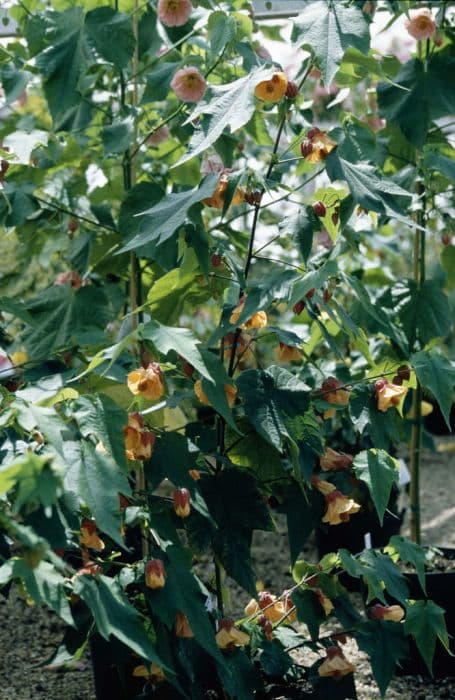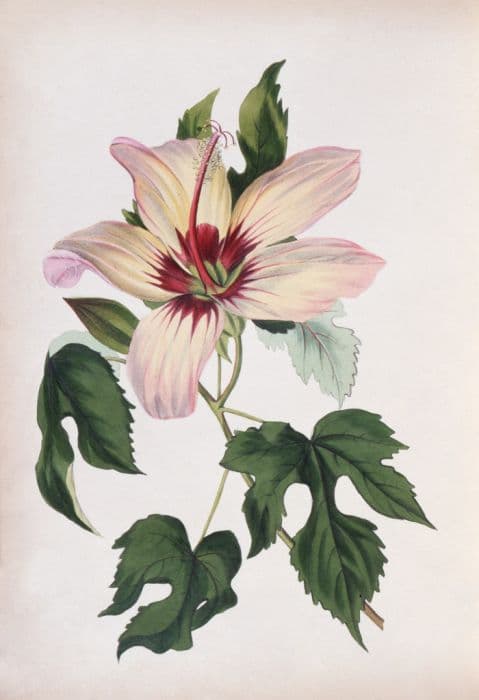Flowering Maple Abutilon 'Lemon Queen'

ABOUT
Abutilon 'Lemon Queen' is a decorative plant known for its showy blooms and attractive foliage. It is commonly referred to as the 'Lemon Queen' flowering maple, although it is not a true maple. The plant features beautiful heart-shaped leaves with a matte texture and a deep green hue that create a lush backdrop for its flowers. The standout feature of 'Lemon Queen' is its delicate, bell-shaped flowers. These blossoms have a soft lemon-yellow color, giving the plant its common name. The petals exhibit a gentle satin sheen and may have subtle veins running through them, adding a touch of elegance to their appearance. Each flower hangs gracefully from a slender stem, swaying slightly in the breeze, which adds a dynamic quality to the plant's display. These gorgeous blooms are prolific, often appearing in clusters that can cover the plant, creating a stunning visual impact in any garden or as part of a container display. The contrast between the yellow flowers and dark green leaves is visually striking and can add a splash of color to any setting. This 'Lemon Queen' has a bushy and branching growth habit, spreading its stems outward with a generous coverage of foliage. The leaves are typically arranged alternately along the stems and have slightly toothed edges, contributing to their attractive texture. The plant maintains a full and robust appearance throughout its growing season, providing continuous visual interest.
About this plant
 Names
NamesFamily
Malvaceae.
Synonyms
Flowering Maple, Chinese Lantern, Chinese Bell Flower, Parlour Maple.
Common names
Abutilon 'Lemon Queen'
 Toxicity
ToxicityTo humans
The plant known as Flowering Maple 'Lemon Queen' is not commonly listed as toxic to humans. There is no significant evidence to suggest that it contains any harmful compounds that would lead to poisoning upon ingestion. However, as with many plants, individual sensitivities, allergies, or unidentified compounds may cause mild stomach upset or other allergic reactions in some sensitive individuals. It is generally advisable not to ingest parts of ornamental plants not established as edible.
To pets
Flowering Maple 'Lemon Queen' is not typically considered a poisonous plant to pets such as cats and dogs. There is no widespread documentation of this plant causing significant toxic effects in pets, suggesting that it is relatively safe in a household with animals. However, ingestion of plant material may still result in gastrointestinal upset for some pets due to the non-digestible nature of most plant matter. In such cases, symptoms might include vomiting or diarrhea, indicative of a non-specific reaction rather than a toxic one. Always monitor pets and keep an eye out for any adverse reactions when introducing new plants to their environment.
 Characteristics
CharacteristicsLife cycle
Perennials
Foliage type
Semi-deciduous
Color of leaves
Green
Flower color
Yellow
Height
5-8 feet (1.5-2.4 meters)
Spread
2-4 feet (0.6-1.2 meters)
Plant type
Shrub
Hardiness zones
9
Native area
South America
Benefits
 General Benefits
General Benefits- Attractive Flowers: Abutilon 'Lemon Queen' produces beautiful yellow, bell-shaped flowers that add a tropical touch to gardens.
- Long Blooming Season: It has a lengthy flowering period from late spring to early fall.
- Attracts Pollinators: The flowers attract butterflies and bees, which are essential for pollination in the garden.
- Ease of Care: This plant is relatively easy to grow and maintain, with minimal pruning needed.
- Drought Tolerance: Once established, it can withstand periods of drought, making it suitable for xeriscaping.
- Versatility: It can be used in various garden settings, such as borders, container gardens, or as a standalone specimen plant.
- Rapid Growth: Abutilon 'Lemon Queen' tends to grow quickly, filling in spaces and providing a lush look in a short time.
- Evergreen Foliage: In milder climates, it can retain its foliage year-round, providing continual interest.
- Softens Architectural Lines: The plant's arching branches and soft leaves can help to soften the hard lines of buildings or fences.
 Medical Properties
Medical PropertiesThis plant is not used for medical purposes.
 Air-purifying Qualities
Air-purifying QualitiesThis plant is not specifically known for air purifying qualities.
 Other Uses
Other Uses- Flower Petal Confetti: Petals of the Lemon Queen can be dried and used as a natural confetti for festive occasions or eco-friendly celebrations.
- Craft Projects: The large, heart-shaped leaves can be used in craft projects, such as making leaf impressions in clay or concrete for garden decorations.
- Dye Source: The flowers and leaves of the Lemon Queen may be used to produce a natural dye for fabrics, giving them a soft yellow to green hue.
- Natural Insectary: Lemon Queen can be planted to attract beneficial insects like bees and butterflies, which are essential for pollination in the garden.
- Photography Subject: With its bright yellow flowers, Lemon Queen serves as a striking subject for photographers, particularly those focusing on botanical or nature photography.
- Fabric Printing: The shape and texture of Lemon Queen leaves can be used in fabric printing to create unique patterns on textiles.
- Educational Tool: Lemon Queen can be used in educational settings to teach about plant biology, pollinator attraction, and the lifecycle of perennial plants.
- Culinary Garnish: While not commonly used for consumption, the flowers can be used as an ornamental edible garnish for salads and desserts, provided they haven't been treated with pesticides.
- Frost Protection: Planted in a garden, Lemon Queen can create a microclimate that may help protect nearby less hardy plants from light frosts.
- Artistic Inspiration: Artists may draw inspiration from the Lemon Queen’s vibrant colors and forms for paintings, textile designs, and other artistic creations.
Interesting Facts
 Feng Shui
Feng ShuiThe plant known as Flowering Maple is not used in Feng Shui practice.
 Zodiac Sign Compitability
Zodiac Sign CompitabilityThe Flowering Maple is not used in astrology practice.
 Plant Symbolism
Plant Symbolism- Inner Illumination: The 'Lemon Queen's' bright yellow blooms symbolize enlightenment and spiritual illumination, often representing insight and the ability to find one's way in life.
- Fragility: With its delicate petals, the Abutilon reminds us of the fragile nature of life, urging us to approach our days with gentle care and appreciation.
- Protection: Known for its use in traditional medicine, this plant symbolizes health and protection, often associated with the safeguarding of one's well-being.
- Adaptability: Abutilon, due to its ability to thrive in various environments, represents adaptability and flexibility in life's circumstances.
- Beauty and Warmth: The luminous yellow flowers bring to mind beauty, warmth, and joy, symbolizing happiness and a positive outlook on life.
 Water
WaterFlowering Maple (Abutilon 'Lemon Queen') should be watered deeply but infrequently, allowing soil to dry slightly between watering sessions. In general, watering once a week with about 1-2 gallons, depending on the size of the plant and the weather conditions, is sufficient. During hot, dry spells, more frequent watering may be necessary. It's important to avoid waterlogging, which can lead to root rot, so ensure that the pot has good drainage. Adjust the watering schedule according to the season, watering less frequently during the winter months when the plant is not actively growing.
 Light
LightThe Flowering Maple thrives in bright, indirect sunlight. It prefers a spot where it can receive plenty of light but is shielded from the harsh afternoon sun, such as near an east-facing or west-facing window. If placed outdoors, partial shade is ideal to protect its leaves from scorching.
 Temperature
TemperatureThe Flowering Maple prefers a temperate climate with temperatures ranging between 60 and 75 degrees Fahrenheit. It can tolerate a minimum temperature of around 50 degrees Fahrenheit, but it should not be exposed to temperatures below that as it could damage the plant. Aim to provide a consistently warm environment with minimal temperature fluctuations for optimal growth.
 Pruning
PruningPruning the Flowering Maple is important to maintain its shape and encourage a bushier growth with more blooms. Prune in late winter or early spring before the new growth begins, cutting back leggy branches and any dead or damaged wood. Pruning can be done annually, or as needed to remove dead leaves and spent flowers to keep the plant looking tidy.
 Cleaning
CleaningAs needed
 Soil
SoilFlowering Maple 'Lemon Queen' thrives in well-draining, fertile soil with a mix of peat, perlite, and compost. The best pH for this soil mix should be slightly acidic to neutral, ranging from 5.5 to 7.5.
 Repotting
RepottingFlowering Maple 'Lemon Queen' should be repotted every 2-3 years or when it outgrows its current container, to ensure proper root space and soil freshness.
 Humidity & Misting
Humidity & MistingFlowering Maple 'Lemon Queen' prefers moderate to high humidity levels, ideally between 40-60%, to promote healthy growth and vibrant blooms.
 Suitable locations
Suitable locationsIndoor
Place Flowering Maple in bright, indirect light, and ensure high humidity.
Outdoor
Situate Flowering Maple in semi-shade and protect from strong winds.
Hardiness zone
9-11 USDA
 Life cycle
Life cycleThe life of the Flowering Maple 'Lemon Queen' begins with seed germination, initiated by warm temperatures and moist soil conditions. Once the seeds sprout, a juvenile stage follows, characterized by rapid leaf growth and the development of a root system that establishes the plant. As it enters the vegetative stage, the Flowering Maple 'Lemon Queen' produces more leaves and stems, building up resources for reproduction. Transitioning into the reproductive phase, the plant starts to develop distinctive bright yellow flowers with a bell shape, attracting pollinators for sexual reproduction. Following pollination, seeds develop within the fruits (schizocarps), which eventually disperse for new plant growth, completing the cycle. During its lifetime, the Flowering Maple 'Lemon Queen' may also propagate asexually via cuttings, which root readily to form new plants.
 Propogation
PropogationPropogation time
Spring-Early Summer
Abutilon 'Lemon Queen', commonly known as Flowering Maple 'Lemon Queen', is most commonly propagated through stem cuttings, particularly in spring or early summer when plant growth is most vigorous. To propagate, one should take a cutting about 4 to 6 inches (approximately 10 to 15 centimeters) long from a healthy, non-flowering stem. The leaves on the lower half of the cutting should be removed and the cut end dipped in rooting hormone to encourage root growth. Then, the cutting should be placed in a pot filled with a mix of peat and perlite or sand to ensure good drainage. The cutting needs to be kept in a warm environment with indirect light and the soil should be kept consistently moist. In a few weeks, the cutting should establish a good root system and can then be transplanted into a larger pot or directly into the garden.









